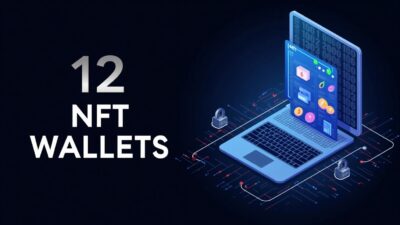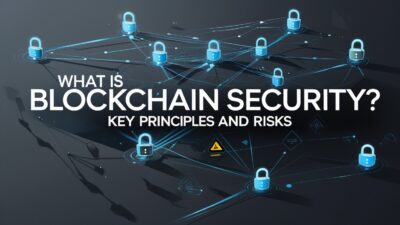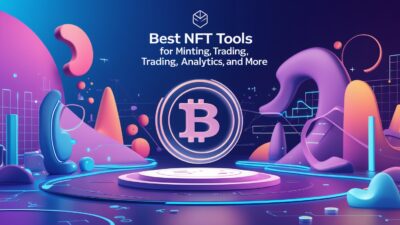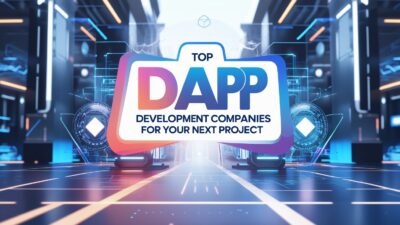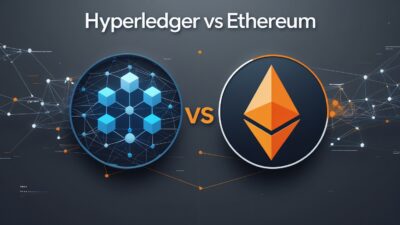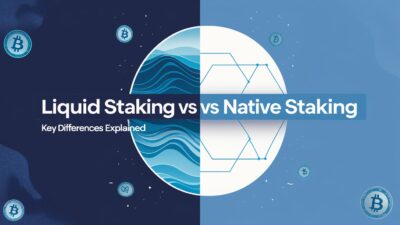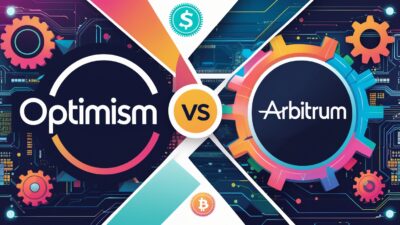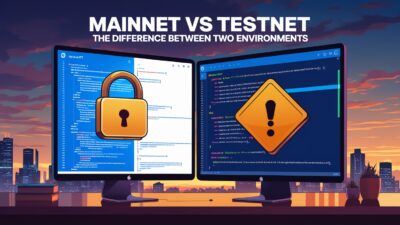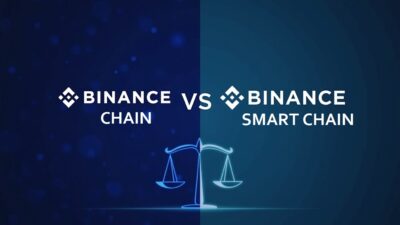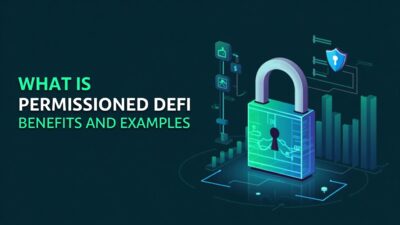
Did you know that more than 69 million contracts have been deployed on the Ethereum network, and the unique bytecodes figure around only 2.5 million in 2025? This underlines the transformation of smart contracts from experimental blockchain curiosities into foundational infrastructure for Web3.
These self-executing contracts power DeFi protocols, facilitating trustless finance, NFTs that enable digital ownership, DAOs that govern decentralized communities, and Web3 businesses that automate workflows.
These contracts not only demand security but are also scalable solutions for businesses, which is why the global adoption of smart contracts is expected to grow from USD 3.65 billion in 2025 to USD 815.86 billion in 2034.
What is Smart Contract Development?
Smart contract development involves designing and coding blockchain-based programs that automatically execute an agreement when the stated conditions are met. These contracts run on decentralized networks like Polygon, Ethereum, or Solana instead of requiring a third party or manual processes.
Some companies consider smart contracts self-executing agreements stored on blockchain with coded rules and outcomes. Once the smart contract is deployed, it can’t be altered. Building a scalable and bug-resistant contract requires developers’ coding expertise, security reviews, and blockchain knowledge.
Web3 startups and businesses take smart contract development as a means of,
- Automation: Tasks like royalty payouts, token transfers, or escrow releases execute without human intervention.
- Enabling Trustless Transactions: Parties engaged in transactions don’t need to be familiar with or trust each other because blockchain enforces the terms automatically.
- Decentralized Applications (dApps): Smart contracts operate as backend logic powering DeFi protocols, DAOs, NFT marketplaces, supply-chain platforms, and other Web3 solutions.
Why Businesses and Startups Need to Hire Smart Contract Development Companies
Smart contracts are the core of DeFi platforms, DAOs, NFT marketplaces, and enterprise blockchain solutions. This stresses their secure building, which requires technical expertise.
Professional smart contract development companies have proven technical expertise with a team of blockchain engineers that specialize in writing, testing, and auditing the self-executing code and ensuring the contract is not just functional but also resistant to bugs and logic errors.
Hiring specialized agencies guarantees scalability and compliance as these contracts can handle high transaction volumes, integrate with multiple blockchains, and meet regulatory standards. Furthermore, partnering with these companies reduces operational risks while accelerating time to market with secure and enterprise-ready smart contract solutions.
Top Smart Contract Development Companies to Consider in 2025
The right smart contract development agency helps secure the success and security of a Web3 project. The table below shows the best companies to consider in 2025 based on their specialization and how they bring project visions to life
| Company Name | Founded In | Team Size | Expertise | Supported Blockchains | Headquarters | Engagement Model |
| ConsenSys | 2014 | Over 700 employees | Building and scaling tools and enterprise software products powered by Ethereum | Ethereum and other Ethereum-compatible blockchains | United States | Multi-faceted engagement model |
| SoluLab | 2014 | Over 201-500 employees | Blockchain, AI/ML, Generative AI, Web3 and dApp, Custom Software, and mobile apps development | Layer 1 blockchains like Ethereum, Solana, and Polkadot and Layer 2 scaling solutions | United States | Fixed price, time and material, and a dedicated team of developers |
| TokenMinds | 2016 | 11-50 | Launching and scaling Web3 and gaming projects, and engaging users | Proof-of-work, Ethereum, Litecoin, Layer 1 (Antelope protocol), and Bitcoin blockchain | Singapore | It is a “trusted partner” with a “white glove” approach, offering strategies and solutions that focus on the long-term success of their client |
| Antier | 2003 | Around 600 | Blockchain development (Layer 1 and layer 2 protocols), Metaverse and NFT development, asset tokenization, AI development, custom enterprise blockchain solutions | Layer 1 and 2 (Ethereum, Polygon, Solana, Binance, Cardano, Avalanche, Optimum, Fantom) and EOS, Hyperledger, TRON, Steller, Algorand, Tezos | India | Fixed-prices (project-based), time and material, and dedicated resource |
| LeewayHertz | 2007 | Over 100 | AI, blockchain, IoT, metaverse, and software development | Ethereum, Stellar, Cosmos, Solana, NEAR protocol, Polkadot, Cardano, Polygon, Hyperledger | USA | Dedicated development team, project-based model, and team extension |
| Vention | 2016 | Around 1001-5000 employees | Software development, web and mobile development, quality assurance, DevOps, cloud consulting, cybersecurity, and emerging technologies like AI and VR | Artbitrum One, Optimism, Polygon, and Lightning Network | New York, USA | Self-augmentation, dedicated teams, and project outsourcing |
| Suffescom Solutions Inc. | 2011 | 201-500 employees | Mobile app development, AI, web3 and blockchain, software and web development, and AR and VR | Ethereum, Optimism, Solana, BNB, and Avalanche (Exchange chain, Contract chain, and platform chain) | USA | Fixed price, hourly price, and dedicated hiring |
| Altoros | 2001 | 400+ IT consultants | Software development, Web3 integration, custom software development, and serving FinTech, banking, and healthcare | Hyperledger, Fabric, Ethereum, Quorum, and Corda | USA | Fixed price, Time and materials, dedicated team, and hourly price |
| PixelPlex | 2007 | 101-250 employees | Blockchain, AI, IoT, web and mobile app development, data engineering, DeFi, and Web3 | Ethereum, Bitcoin, Cardano, Polkadot, Echo, Solana, Binance Smart Chain, Polygon, and TON | USA | Fix bid, time and material, hourly pricing |
| HashCash Consultants | 2015 | 201-500 employees | Blockchain, AI, Big Data, and IoT along with white-label crypto exchange and payment processor software and customized use case development | Bitcoin, Ethereum, XRP ledger, HC NET | USA | dApps development platform, reseller program, preferred integration partner, and HashCash cloud partner |
1. ConsenSys

Founded in 2014 by Ethereum co-founder Joseph Lubin, ConsenSys is the most recognized name in the industry that builds core Ethereum infrastructures (like MetaMask and Infura) and offers them enterprise-level smart contract development and audits through ConsenSys Diligence.
This makes it a go-to company for enterprises aiming to launch or audit Ethereum-based dApps and DeFi protocols.
2. SoluLab

SoluLab is a US-based company founded in 2014 that offers full-stack Web3 services, including blockchain, AI/ML, generative AI, and mobile apps. It supports multiple Layer 1 and 2 chains like Ethereum, Polkadot, and Solana.
SoluLabs is best for NFT marketplaces, DeFi apps, and custom blockchain solutions requiring fast turnaround and multi-chain support.
3. TokenMinds

TokenMinds helps Web3 and gaming projects launch and scale while focusing on user engagement, marketing strategy, and smart contract development. Founded in 2016 in Singapore, the company is known for its “white-glove” approach, which emphasises long-term partnerships.
TokenMinds is recommended to startups looking for both tech build and user-base growth.
4. Antier

Antier offers end-to-end blockchain services, including Layer 1 and 2 protocol development, metaverse solutions, NFTs, AI, and asset tokenization. Founded in India (2003), Antier supports Ethereum, Polygon, Binance, Cardano, Solana, EOS, Avalanche, Hyperledger, TRON, and many more blockchains.
The company is ideal for enterprises requiring custom multi-chain or cross-industry blockchain platforms.
5. LeewayHertz

Founded in 2007 in the US, LeewayHertz specializes in blockchain, AI, metaverse, and software development. The company supports various blockchains, including Ethereum, Solana, Stellar, Polygon, Cosmos, NEAR, Cardano, and Hyperledger.
LeewayHertz is recommended to businesses requiring a seasoned software house that aims to blend AI and blockchain.
6. Vention

Based in New York (2016), Vention is one of the largest technology company with over 1,000 engineers and is known for web and mobile development, DevOps, and QA. It is known to deliver blockchain projects on Artbitrum, Polygon, Optimism, and Lightning Network. Vention is best for enterprises that blend talent pools (Web2 + Web3 + cloud).
7. Suffescom Solutions Inc.

Founded in California in 2011, Suffescom specializes in AI, AR/VR, mobile, and blockchain solutions that support dApps on Ethereum, Solana, BNB, Optimism, and Avalanche chains. This makes it ideal for businesses building metaverse or AR/VR-integrated dApps.
8. Altoros

Founded in 2001, Altoros is a US-based firm with over 400 IT consultants. The company specializes in Web3 integration, custom software, and services for FinTech, banking, and healthcare. It supports blockchains like Hyperledger, Ethereum, Corda, Fabric, and Quorum.
It is best for financial institutions and businesses requiring secure and audited blockchain systems.
9. PixelPlex

PixelPlex holds expertise in blockchain, IoT, AI, Web3, DeFi, data engineering, app development. Based in US since 2007, the company supports Bitcoin, Ethereum, Solana, Binance Smart Chain, Echo, Cardano, Polygon, Polkadot, and TON. This makes it a go-to company for cross-platform blockchain solutions and large-scale dApps.
10. HashCash Consultants

Founded in the US in 2015, HashCash Consultants provides blockchain, AI, Big Data, IoT solutions, white-label crypto exchanges, and payment processors. It supports Bitcoin, Ethereum, XRP Ledger, and its own HC NET network. HashCash is best for companies looking for ready-to-deploy exchanges, payment gateways, or custom blockchain use cases.
Choosing the Right Smart Contract Development Partner for Your Needs
Choosing the right partner is a strategic decision to gain a secure, scalable product rather than a vulnerable, risky deployment. To do this, the first thing you need to do is clearly define your project scope, say what kind of smart contract you need, what features you need, and your requirements for performance and scalability. A small fixed-price contract might be enough for simple tokens, but complex apps require firms with broad blockchain expertise and a proven success record.
While security is non-negotiable, thorough audits and formal verifications should be deployed to check for vulnerabilities in the contract. Further budget and blockchain expertise are also important; you might find a cheap partner, but it might not necessarily be experienced on your target chain, leading to hidden costs, mistakes, and longer development. So make sure to check supported blockchains and how the engagement models align with your timeline and risk tolerance.
Estimating the Costs of Smart Contract Development
The cost of a smart contract depends on its complexity, the blockchain used, and whether or not audits and integrations are included. A professional agency will charge USD $5,000 to $10,000 for simple ERC-20 or BEP-20 token contracts with basic functionalities or projects requiring more logic, like NFT minting.
For more complex DeFi systems, the cost rises steeply to around USD $15,000 to $100,000+, depending on modules, integration, audit, and security layers. Security auditing and maintenance also cost between $5,000 and $50,000 or more, depending on contract size and complexity.
Final Thoughts
The right smart contract development company future-proofs your ambitions, and only a strong partner truly understands the blockchain ecosystem your industry needs, along with the compliance and security risks that follow decentralized systems.
When choosing a partner, consider three pillars: expertise, cost, and scalability. These three factors determine whether the product will withstand real-world demands, from high traffic to regulatory perspectives.
Suppose you want to deepen your knowledge on smart contracts, Web3 tools, or DeFi. In that case, Dypto Crypto should be your next spot as it offers a full suite of learning resources, with complete courses, explanatory guides, and Cryptionary and DeFi explorer. These resources help you make informed decisions and avoid costly mistakes.
FAQs (Frequently Asked Questions)
Q: How much does it cost to develop a smart contract?
A simple ERC-20 token and NFT minting contracts cost between $5,000 and $10,000, while complex DeFi or DAO systems cost around $15,000 to $100,000+ (depending on scope, security audits, and integrations).
Q: How long does it take to build a smart contract?
A simple token or NFT contract can be built and deployed in a few days or weeks, whereas complex systems can take several weeks to months.
Q: Do I need to hire a company, or can freelancers build smart contracts?
Freelancers can handle simple contracts, but for enterprise or high-value projects, a professional company with dedicated teams, security audits, and scalable architecture is recommended to ensure success.
Q: Which blockchains are best for smart contract development?
Ethereum is a widely supported blockchain, but companies like TokenMinds, LeewayHertz, or Vention are also built on Solana, BNB Chain, Polygon, Avalanche, Hyperledger, or other EVM-compatible networks.
Q: Are smart contract audits included in development services?
Some companies, such as ConsenSys through Diligence, include audits in their development services, whereas others require a separate engagement or third-party audits.




